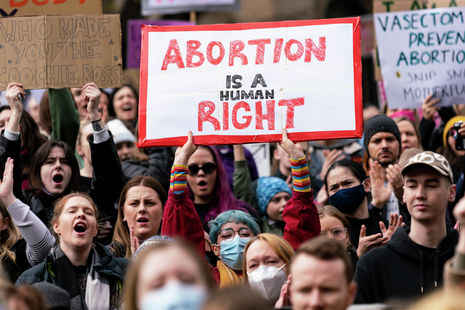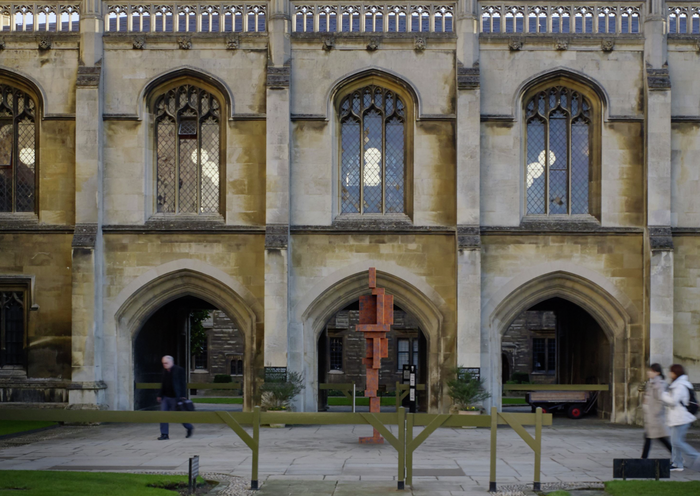Annie Ernaux’s illegal abortion: ‘a frustratingly timeless tale’
Following the overturn of Roe v. Wade, this year’s Nobel Literature Prize winner Annie Ernaux’s novel ‘Happening’ is more important than ever

On October 6, the 2022 Nobel Prize in Literature was awarded to French writer, Annie Ernaux. Like many before me, I was introduced to her writing through 'Happening' — a lightly-fictionalised but harrowing account of Ernaux's illegal abortion. Set in the French city of Rouen in 1963, 'Happening' follows the story of Annie Duchesne, a twenty-three-year-old literature student . Annie repeatedly tries to terminate her unwanted pregnancy, more than a decade before abortion was decriminalised in France. Ernaux, who is known for the pithiness of her writing, manages in 'Happening' to capture a frustratingly timeless tale with unflinching directness.
Annie attends university lectures, speaks (and lies) to her parents, all while trying to find a path toward the termination of her pregnancy. Her indifferent lover; her terrified and terrifying doctor; and the back-alley abortionist, are figures that could just as easily (and terrifyingly) be encountered today. Even in countries where abortion is legally protected and widespread reproductive health services are available, judgment from healthcare practitioners is often the norm, and access to these services is not guaranteed. Reproductive rights still continue to be contested across the world, if not downright denied. This past June, the Supreme Court’s decision to overturn Roe v. Wade brought an alarming end to the constitutional right to abortion in the United States. In Britain, abortion has been legal since 1967 but significant barriers to access remain with termination only legally permitted within the first 24 weeks of pregnancy. In Northern Ireland, abortion was not legalised until 2020.
A frustratingly timeless tale
In one particularly memorable passage, Annie speaks to another young man, who seems endlessly fascinated by her situation. There is something horribly familiar about this unempathetic fascination. To him, she is a perfect heroine of a literary drama. Annie's experience is elevated into a thought experiment, crafting her into a tragic figure. In the endless debate surrounding abortions, both in 'Happening' and in real life, there are still those who forget that the provision of abortions affects real people who wish to access procedures, which may even be life-saving.
The figure of Mme P.-R is equally forceful in 'Happening'. She is the abortionist that performs Annie’s near-fatal surgery on a kitchen table. Ernaux chooses, in the original French, the title L'Événement'— that is, ‘The Event’. A singular moment that marks the life of the protagonist Annie, a moment that almost kills her. Of course, access to reproductive health services is certainly different in 2022 than it was in 1963 France. Yet still, access to abortion is stigmatised and increasingly criminalised. Perhaps it is not accidental that the Nobel Committee explicitly recognise Ernaux’s courage. While the committee denied any political messaging tied to its decision, Ernaux’s victory (or at the very least, its reception) is irrevocably tied to reproductive rights. Days before the announcement was made, Alex Shephard in his prediction of the Nobel winner, acknowledged that 'Happening' is "one of the most profound and moving accounts of the horrors that attend the illegalization of abortion." By choosing Ernaux as the 2022 Nobel Prize for Literature honoree, the committee is implicitly making "a principled statement about reproductive rights", irrespective of whether they intended to.
Ernaux’s autofiction has a truly magical quality. Her own experiences of family, love, and loss feel universal. She writes about herself in the least self-centred manner and in clear, accessible, and unpretentious language. Whether it is 'The Years', ‘I Remain in Darkness’, or 'Simple Passion', Ernaux never shies away from discomfort, disease, or desire. Her willingness to write about her life without shame is yet another reason why Ernaux is beyond deserving of this recognition.
In 'Happening', Ernaux wonders whether the purpose of her life "is for my body, my sensations and my thoughts to become writing" in a way that would cause her "existence to merge into the lives and heads of other people." Ernaux’s writing is undeniably intelligible and universal. Her words have entered and provided solace to many people's lives. 'Happening', despite all its horrors, also comforts its reader. Annie’s lack of safe access to abortion is enraging. In sharing this story, Ernaux transforms what is usually a hidden, whispered experience into a beacon for others to connect to.
 News / SU reluctantly registers controversial women’s soc18 December 2025
News / SU reluctantly registers controversial women’s soc18 December 2025 News / CUP announces funding scheme for under-represented academics19 December 2025
News / CUP announces funding scheme for under-represented academics19 December 2025 Features / Should I stay or should I go? Cambridge students and alumni reflect on how their memories stay with them15 December 2025
Features / Should I stay or should I go? Cambridge students and alumni reflect on how their memories stay with them15 December 2025 Fashion / The art of the formal outfit 18 December 2025
Fashion / The art of the formal outfit 18 December 2025 Lifestyle / Summer lovin’ had me so… lonely?18 December 2025
Lifestyle / Summer lovin’ had me so… lonely?18 December 2025









